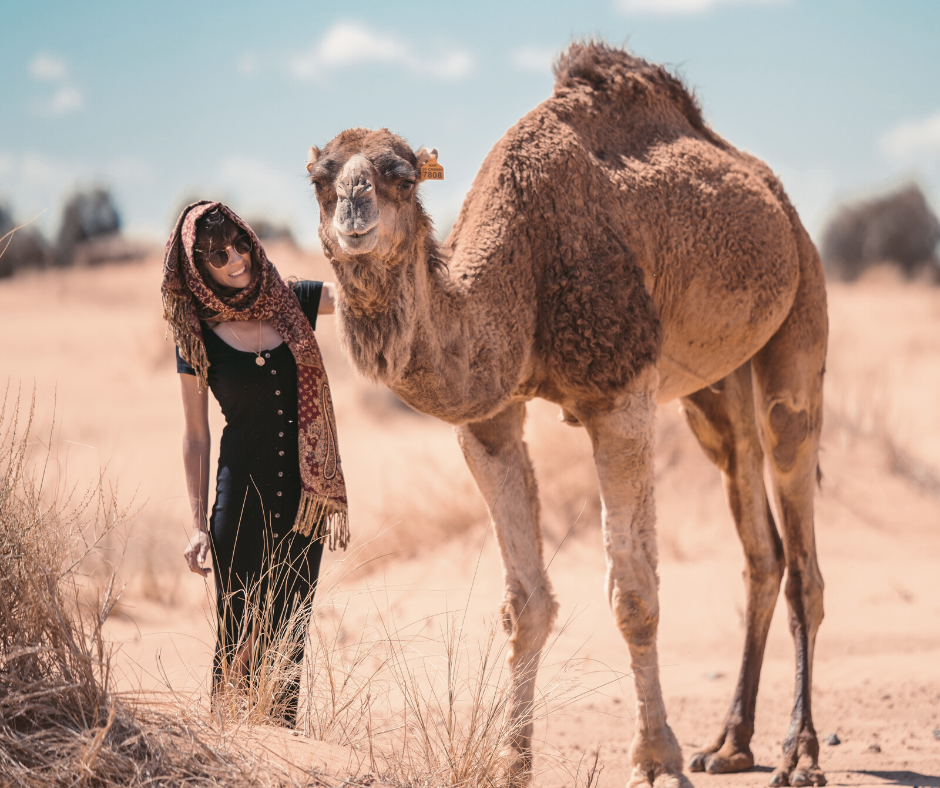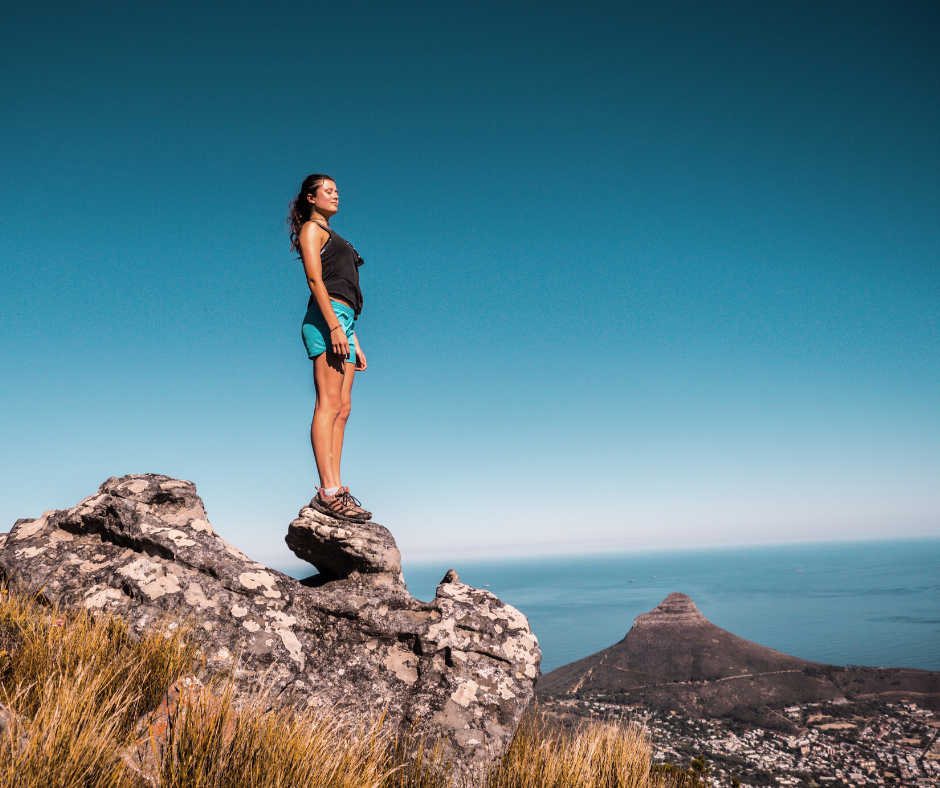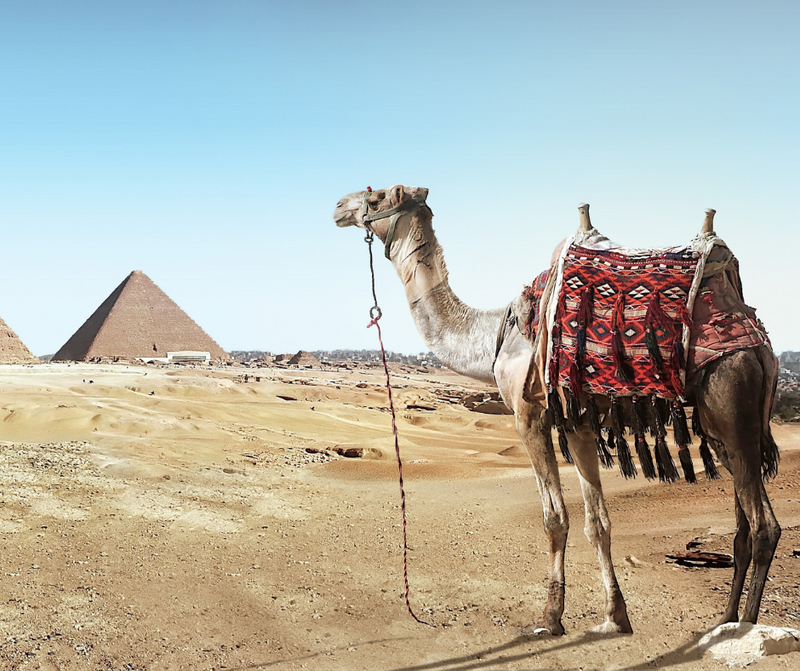Egypt is a historical jewel, both on land and underwater. The former kingdom of the pharaohs is bordered by the Gaza Strip to the northeast, the Red Sea to the east, Sudan to the south, and Lybia to the west. Besides its rich history and cultural diversity, Egypt is a diving and surfing hotspot attracting travelers from all around the world. Vivid corals and colorful, unique underwater species make the reef one of the world's best dive spots.
🌱 Travel health insurance for Egypt
🇪🇬 Entry requirements for Egypt
- Visa: If your passport is not from Bahrain, Hong Kong, Kuwait, Lebanon, Macao, Oman, Saudi Arabia, or the United Arab Emirates you must either apply for an electronic visa or get a visa on arrival. There are currently 74 Egypt e-Visa eligible countries, including the United Kingdom, the United States, and all European Union member states. The visa costs 25 Euro and is valid for 30 days for a single entry and 90 days for multiple entries.
✈️ How to get to Egypt
- Plane: Egypt is directly connected to many countries, and routes are served by international airlines. Cairo has direct scheduled flights from London and New York, with indirect routes from pretty much everywhere, and there are low-cost flights from the UK to Luxor and the beach destinations. The international airports in Egypt are located in Cairo (CAI), Alexandria (ALY), Luxor (LXR), Sharm el Sheikh (SSH), Aswan ((ASW), and Marsa Alam (RMF). Direct flights from Cairo are available to and from other African countries like Morocco, Kenia, and South Africa.
🚌 Public transport
- Uber: For getting around in Cairo or Alexandria, Uber is a decent option. Due to the taximeter, the price is fixed, and you don't have to worry about negotiating. The price for an airport transfer from Cairo Airport to the city is between 2-3 Euro for a 20-minute ride.
- Taxi: Normally taxis operate on a shared basis and it is possible that you will pick up another passenger along the way who wants to go in the same direction. You also find minibus taxis (meecros) with a capacity of up to 12 passengers. Those kinds of taxis normally have fixed fares.
- Metro: The metro system in Cairo covers many areas. It has 3 lines, and it serves 92 stations in the city. The 4th line is already planned and should be operating soon. Trains run every 5 minutes and the ticket price is 5-10 EGP (0,25-0,50 Euro).
- Busses: Taking the bus in Egypt will be one of the cheapest but not the fastest way to get around. Major routes are plied by air-conditioned buses, usually new(ish) and fast. At city terminals, tickets are normally sold from kiosks, up to 24 hours in advance. The airport transfer to Cairo departs hourly and takes around 1 hour.
🏡 How to find a place
- aqarmap: This website has a wide range of furnished apartments in Egypt and contacts with the landlords can be easily set up through WhatsApp. Serious offers start from 500 Euro per month. Make sure you are well informed about all details before you sign a contract.
- Facebook groups: Check out Facebook groups like Digital Nomads Egypt. You need to invest a bit more time to monitor the group but you will find alternatives to hotels and Airbnb listings.
- Airbnb: During the high season, you can find 1 bedroom apartments between 800 and 1,200 Euro monthly rent in Cairo, but prices for modern flats can reach 1,500 Euro per month easily.
🏘 Where to stay in Cairo
Due to traffic and infrastructure, we recommend living close to your workstation and within a district, which fits your day-to-day life the most.
- Maadi: The area of Maadi is well known for its green natural scenery and lakefront which gives a less crowded feeling to the metropolis. Maadi is a tranquil part of the city, a bit out of the way, and a great spot if you want to live between pretty gardens and upscale villas. Within Maadi, you find places for work, lovely bookstores, great cafés, and authentic Egyptian cuisine. Maadi is an expensive neighborhood of Cairo with rents between 700 to 1,000 Euro per month for a 1-bedroom apartment.
- New Cairo: New Cairo forms a new city itself, 15 km outside of Cairo. Here you find large compounds, broad avenues, natural habitats, and amazing properties such as villas and apartments for rent. The average price for a 1-bedroom apartment starts at 600 Euro per month.
🧑🏻💻 Where to work from in Cairo
Coworking spaces
- Urban Station: This coworking space, located in the heart of Cairo is a good choice if you want a cozy and quiet working environment with modern facilities and high-speed internet access. Urban Station offers fully-equipped offices and amenities as well as coffee and pastries. Open space memberships start at 57 EGP (3 Euro) per day.
- mqr: mqr offers a professional working atmosphere and facilities at various locations. You find them 2 x in New Cairo and 1 x in Maadi. Working at a flexible desk, and shared space cost you 5 Euro per day and 58 Euro per month.
- Work Yard: The newly opened coworking space offers a cozy and professional office atmosphere with balconies, a chill-out area, and ergonomic workplaces. Working conditions such as fast internet and office equipment are included in the membership.
- Consoleya: This coworking space is in the heart of downtown Cairo, and is located inside the building of a former French consulate. The old building now serves as a modern workplace with reliable internet, a kitchenette, ergonomic workplaces, and a chill-out area to end the workday. Depending on your needs you can choose different memberships.
Coffee shops
- Lokali Maadi: Enjoy the garden along with some mouthwatering local foods. The café is designed in trending boho-chic Interieur and should be on your list to check out.
- Two Spoons: This café in New Cairo provides high internet speed and is a good option for a work session with delicious coffee and tasty food.
- Espresso Lab: The menu includes coffee specialties, salad or sandwich variations, and sweets such as muffins, cakes, and cookies. Wifi is available and plugs can be found at every table.
Others
- Al-Kotob Khan: This place is a bookstore within the Maadi district and a good and silent place to work from. You can work here on 2 floors, enjoy free wifi, and get served fresh juices, fruits, or salads.
🏘 Where to stay in Dahab
- Lighthouse Camp: The newly built Lighthouse Camp rooms are just behind the Mojo Cowork Café. Situated in the center of the Lighthouse, you can benefit from the many shops, restaurants, and, of course, the sea less than 50 meters away. Each room is equipped with a comfy interior, ensuite bathrooms, and a private balcony.
🧑🏻💻 Where to work from in Dahab
Coworking spaces
- Mojo Cowork Café: Located next to Lighthouse Camp, you find Mojo Café that offers flexible half-day memberships for 5 Euro, and full-day memberships for 8 Euro.
Coffee shops
- Treats: Located in the lighthouse area, Treats is a great spot for breakfast and lunch as well as a short work session.
- Flat White: What else do you need besides good coffee and a place with wifi? Yes, the sea. Located directly at the seafront, Flat White offers relaxing views, welcoming staff, and good food. You will find nomads here as well.
Others
- Blue Beach Club: The hotel offers a coworking-kinda space on its rooftop, which is pretty, instagramable, and good to check out. You can choose between a professional workstation under the sun or a child hammock.
🚊 How to travel around Egypt
- Car rental: With an international driving license you can rent a car in Egypt. Self-driving can be nerve-wracking due to poor road conditions. It’s worth researching as rates and terms vary considerably, you will pay a minimum of 75 Euro per day with unlimited mileage.
- Train: The Egyptian railway system is the oldest railway network in Africa and the Middle East. It is the best way for long journeys because shorter journeys are usually slower and less comfortable. There are 3 classes of carriage on the train. The first and the second ones should come with air conditioning. Schedules are published every 6 months.
- Dahab: The easiest way to get to Dahab is to fly into Sharm El-Sheikh and then take a bus. The ticket price is 1 Euro. You may also take a 10-hour bus ride from Cairo's airport. Taxis are an option in both circumstances, but even for the short trip from Sharm El-Sheikh to Dahab, they may cost upwards of 200 Euro. Dahab may also be reached by bus or taxi from Taba, which is the closest Israeli town to Dahab. Every day at 3 p.m., the bus leaves for 50 EGP (3 Euro).
🎖 Must see
- Pyramids of Giza: Easy and worth doing a half-day trip is driving to the famous pyramids of Giza. Despite heat, dust, and crowds, seeing the Sphinx might take you to the adventures of Asterix & Obelix, the famous Belgium comic. Giza is about 30-min. drive outside of Cairo. A taxi is between 3 and 5 Euro.
- Khan el-Khalili: While in Cairo you should explore the bazaar (Souq) with all its small alleys and tiny stores, selling traditional Egyptian products and locally woven textiles. The easiest entry to the Khan el-Khalili area is from Al-Azhar Street, directly across the road from Al-Azhar Mosque
- Desert Camping & Safari: Camping in the desert is a must-have experience while in Egypt. Take in the night sky (and maybe even the Milky Way) while dining at a BBQ diner prepared by Bedouins. Depending on the operator you book with, a 1-day guided desert experience would start at 140 Euro per person.
- Mount Sinai: While being in Dahab visit Mount Sinai. The ride takes approximately 2 hours by car. The taxi price should be around 70 Euro. Hiking to the top of the mountain takes about 3 hours depending on your pace and fitness level.
- Dahab Blue Hole: The Blue Hole is a deep, natural sinkhole, formed during the melting of the last ice age in the Gulf of Aqaba. The hole is considered to be one of the most significant natural landmarks in Egypt. Located just 10 km north of Dahab, the price for a taxi is around 3-5 Euro.
💡 Good to know
- Internet: Egypt covers an average speed of 41.10 Mbps download and 7.07 Mbps upload speed in 2022.
- Sim card: There are 3 main mobile internet operators in Egypt: Vodafone, Orange, and Etisalat. You can buy a sim card at the airport (located at the luggage belts and not inside the arrival hall like usual) or at shops in towns. Due to coverage, price, and data package, Orange packages might be a good option. You can get 16 GB for 150 EGP (7,60 Euro), valid for 30 days.
- Digital Nomad Community: Facebook communities like Digital Nomads in Egypt, Dahab Digital Nomads, and Dahab remote workers are great places to meet other remote workers and make friends.
- Cost of living: Average cost of living as a digital nomad in Egypt is around 1,000 Euro per month including rent.
- Currency: The Egyptian Pound (EGP) is the main currency, and 1 Euro converts to 19,55 EGP.
- Climate: Egypt's climate is dry, hot, and dominated by desert. It has a mild winter season (November to April) with rain falling along coastal areas, and a hot and dry summer season (May to October). The average winter minimums are 14°C and the maximum average temperature during summer is 30°C.
- Safety: If you stay in bigger cities and in normal tourist areas, Egypt is a safe country. It's not advised to travel without guidance to some desert areas or borders.
- Tipping: A minimum of 10% tip is expected.
- Ramadan: Have in mind that Ramadan is a 1-month-long holiday in Egypt where Muslims fast from sunrise to sunset. The exact dates of Ramadan change with each lunar cycle and typically fall between April and June.
- Bakseesh: Baksheesh, which operates as either a tip or a bribe is standard in Egypt. Which category it falls under is determined by the situation, and its interchangeability and existence are a part of everyday life in Egypt and cultural customs.
🚧 What to avoid
- Don’t forget to negotiate: Never hand over the money in an Egyptian souk or market at the first price given. The negotiation process is expected here and a part of the culture. Don’t be afraid to enter negotiation mode on everything from spice to large souvenirs. The easiest way to start is to offer half of the price offered.
- Unsafe areas: There are some land border areas like Egypt to Gaza, the Western Desert which divides Egypt from Sudan and Libya, or the Hala’ib Triangle (the border to Sudan) which should be avoided by tourists due to military zones and occupied territories.
🚴🏻♀️ How to stay healthy
Stay healthy
- Stay hydrated: The oppressive heat in Egypt can easily lead to dehydration. You can prevent dehydration by drinking enough water, dissolvable sport rehydration tablets, and combining water with electrolytes.
- Vaccination: You should have your routine vaccines, like measles-mumps-rubella (MMR) and tetanus-diphtheria up to date. Recommended vaccinations include also Rabies, Hepatitis A, and Typhoid. If you are unsure which vaccinations are recommended, you can consult your local tropical disease clinic.
- Watersports: Most expats come to Dahab for diving or kitesurfing because it offers ideal conditions for all levels of kitesurfers, from beginners to experts. Dahab is home to a wide variety of diving schools and if you've always wanted to learn how to scuba dive, or if you just want to go on a few fun dives, this is the place for you.
- Hiking: Ras Abu Gallum is a Managed Resource Protected Area that lies north of Dahab. The famous Blue Hole dive site is reached after a 10 Minute car ride from Dahab, which costs around 7 Euro. The hike itself to Ras Abu Galum is about 2 hours.
Health risks
- Water quality: Drinking tap water in Egypt is not advised.
- Air quality: The air quality in Egypt is moderate
⚓️ Long stay
If you want to stay longer than the maximum of 30 days, there is unfortunately only one way to apply at the Egyptian Passports, Immigration, and Nationality Administration office in the old Police Academy in Abbasiya, Cairo. The office is open between 8 am – 2 pm every day except Friday (Saturday is for pickups only). It is necessary for most applicants to return twice to the office. The visa will be granted for 3 further months (no other options are available). The visa extension is officially called Foreign Residence Card and takes the form of a plastic ID card.









